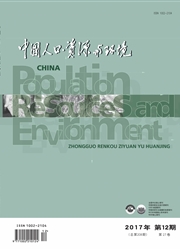

 中文摘要:
中文摘要:
本文基于江苏省苏北地区灌云县和金湖县的农户调研,采用内生性处理回归模型考察政府干预下土地流转对不同类型农户收入的影响,并从农户土地和劳动力资源配置效率的角度解释农户收入变化的根源。研究结果表明,政府干预下土地流转对不同类型农户收入的影响效应有很大差异,农户土地转入后收入增加了161.2%,转出户收入并未显著增加;从农户资源配置角度考察,发现农户转入土地后农业生产效率显著提高,转出土地后农业生产率降低;农户土地转出后非农工作时间和工作报酬并未显著增加,表明转出户并未提高非农劳动力资源配置效率。同时,本文比较政府主导和农户自发两种类型农地流转对农户收入和资源配置效率的影响差异。结果发现,相对于自发土地流转的农户,政府主导下农户转入更大面积土地,并显著提高了单位面积土地生产效率和家庭收入水平;而政府干预土地转出不利于农户土地和劳动力资源配置效率及收入水平的提高。基于以上分析,本文认为政府干预降低了土地流转交易费用,有利于转入户扩大土地面积,实现规模经济效益,进而增加转入户收入;然而,政府干预下转出户资源配置面临较大约束,配置效率和收入都未能实现最大化。因此,政府在完善农地流转服务政策的同时,应当尊重农户土地流转意愿,使得农户土地流转符合家庭资源配置收入最大化目标。同时,要通过非农就业培训、发展非农经济,吸纳更多劳动力转移到非农业领域,进一步促进农村土地流转和规模经营,优化农村土地和劳动力资源配置效率,持续增加农民收入。
 英文摘要:
英文摘要:
This paper studies the impact of land transfer under government intervention on household income and resources allocative efficiencies using survey data collected from Guanyun County and Jinhu County in the North of Jiangsu Province. Heterogeneity is accounted for in an endogenous treatment effect framework. Results show that land transfer under government intervention had different effects on household that rent in land and rent out land. For household that rent in land, their income increased by 161.2% and agricultural production also increased significantly through renting in land. However, for households that rent out land, the current large-scale transfer under government intervention did not necessarily improve their income; their agricultural productivity also decreased while off-farm labor use efficiency did not increase. We also compared the different effects of land transfer led by government and farmers' free behavior on household income and resources allocative efficiencies, and found that farmers rent in more land under government intervention and they had higher income and agricultural production, while farmers who freely conducted land transfer got more total income and nonagricultural labor use efficiencies. Thus, land transfer led by government is beneficial to households that rent in land, but has the negative impact on households that rent out land. Policy implications include that government should further improve land transfer by relevant policies. In this process, household participation willingness should be fully respected to maximize their incomes and government should take measures to develop rural economics and the transfer of the rural labor force in order to promote land transfer and scale management. Thus, rural land and labor allocative efficiencies can be improved to continue to increase household incomes.
 同期刊论文项目
同期刊论文项目
 同项目期刊论文
同项目期刊论文
 期刊信息
期刊信息
